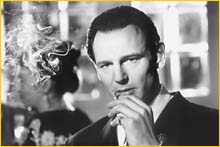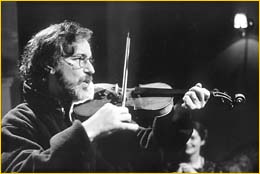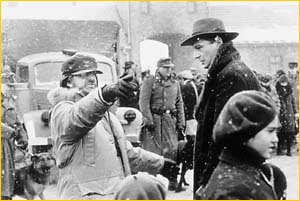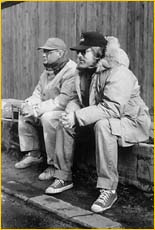
The Schindler’s List DVD features meaningful bonus materials that further illuminate the film’s powerful subject matter. A moving 77-minute documentary produced by the Shoah Foundation entitled Voices From the List offers never-before-seen testimonies from actual Schindler survivors, as they recount their real-life experiences with the man who saved their lives. The DVD also features The Shoah Foundation Story with Steven Spielberg, a behind-the-scenes look at works and accomplishments of the Survivors of the Shoah Visual History Foundation. Its mission is to overcome prejudice, intolerance and bigotry – and the suffering they cause – through the educational use of the Foundation’s visual history testimonies. For more information, contact the Shoah Foundation at www.vhf.org/givingvoice.

by Susan Royal
Photos by David James
The Holocaust occurred only 50 years ago and yet there are those who deny its existence. In fact, Schindler's List was given Britain's prestigious literary award, the Booker's Prize, for fiction.
Keneally thinks that's one of the most overlooked ironies - that his book won for fiction, not non-fiction. And he was quite amazed at their findings. Perhaps it was because the book was based on interviews and the words "based on" have some sort of stigma.
|
Director Steven Spielberg on the set of Schindler's List, showing how he wants the violin and bow held for a scene with Henry Rosner. |
But the book was written in an almost documentary style, with Keneally reporting all sides to the story.
That's what I liked about the book. And that's why I wanted to do the film, because it was not just another Holocaust story.
Were you shocked at the amount of anti-Semitism you found still in Poland today? There were several reported around the set.
No, I had expected it. It was actually less than I thought would happen and I was prepared for more incidents than we encountered. But they were incidents nonetheless. And every one was shocking. Nothing happened to me directly, but things happened to my cast, my crew, and I would hear about it the next morning.
Before the war there were some 60,000 Jews in Krakow; they comprised 25 percent of the population. Today, there are less than 500.
Yeah, Hitler killed all of 'em. He just killed everybody.
Do you think the anti-Semitism in Poland was so strong that to this day Jews have not wanted to return to Poland?
Yes, because, look, Krakow has been both the bastion of Jewish culture in Poland and anti-Semitism for centuries. The Jews invited the wall around their ghetto to protect them from Polish citizens that they would often have to do business with. They looked upon the walls as a fortress against anti-Semitism and against all sorts of personal, emotional atrocities. Well, when the Nazis came along the Jews willingly went to the ghetto because that was their lot in Polish life. They expected it, they were protected by it, and they felt relatively safe because the Nazis suggested the walls go up. And the Jews were very comfortable. They thought you get into the ghetto and you'll be able to have Jewish culture. They didn't understand that there was a script that had been written for them with a very defined ending.
Your research went beyond Keneally's book.
I interviewed survivors, I went to Poland, saw the cities and spent time with the people and spoke to the Jews who had come back to Poland after the war and talked about why they had come back. I spent more research time on this project than I had on any previous film, but of course my films were never based on anything that actually happened. So, I was enthusiastic about going to Poland. I needed to go for inspiration. I only knew Schindler's List from the novel and now I wanted to know it from the survivors and from the actual historical landmarks. So, I went there for that reason. And I came back as excited as I've ever been about a subject that doesn't excite me, but pains me. I always knew these things happened, but it's different when you actually see the sign "Pomorska Street," and you know all the horrible things that happened on Pomorska Street, but there's the sign and there's Schindler's actual apartment, there's Amon Goeth's actual villa where he stayed. And to touch history, to put my hand on 600-year-old masonry, and to step back from it and look at my feet and know that I was standing where, as a Jew, I couldn't have stood 50 years ago, was a profound moment for me as a re-creator of an incident in history; it meant more to me as a Jew. So, I went there the first time to research a movie and wound up researching my own Judaism.
|
Steven Spielberg directing Liam Neeson on location for Schindler's List. |
When was that?
That was three years ago.
How did your association with [producer] Branko Lustig come about?
He came to us. He sought us out. He said, "Here are my credentials," and rolled up his sleeve and there were the numbers from Auschwitz. He said, "I have been pursuing you for a long time and you're a very hard man to get to meet. I want to produce this movie. I know these people. I know these individual stories, and I think I can be of great benefit to you." And he absolutely was. One of the best decisions I've made was to reward his persistence because he turned around and awarded the story with great authenticity. For example, he found me some of the best faces among the extras.
It's always hard to adapt a novel, but were there any particular difficulties adapting this one?
The difficulty was what we couldn't use because we just didn't have time to use it. That's the only difficulty. The novel sort of suggested a progression, because it was what happened. I just had to, with Steve Zaillian, find a way of taking the novel, and not so much distill it, but just find all the moments that moved me the most and were the most informative. In the process of Schindler's almost transparent transformation from a businessman to a savior, the novel didn't give me those clues. It didn't tell me why Schindler did it. And none of the witnesses could tell me why Schindler did it, even though I asked everybody I met. And they all said, "It's not important why he did it, it's only important that he did." There were a lot of easy answers like that. The novel was suggestive, but it wasn't essentially a point-to-point map of how to tell the Oskar Schindler story. I was really telling the story about the Shoah, which is really what the movie sets out to do and does.
It seems that women had more influence over him than men. Although Itzhak worked beside Schindler every day and tried to influence him to help the Jews, he resented it. He said, "Don't ever do that to me again," when Itzhak brought him the one-armed man. Yet, when a woman - a stranger, Regina Perlman - pleas for him to take in her parents, he commits his first act of generosity in the film.
Yeah, that's right.
Even though he gets angry and goes to Itzhak and defends Goeth immediately, we see that he is only trying to convince himself not to help her.
Yes, yes, yes. It's true. That's the area in the film where he makes his biggest transformation. Absolutely true.
And in the next scene Helen Hirsch tells him more about the dark side of Goeth and he is moved by her. So it appears that it was the women who were able to get through to him.
Yes. He loved women. He loved women and I think he was much closer to his mother than he was to his father. He thought women were madonnas to be respected and to be upheld. And, really, almost like deities. He had a great deal of respect - and I think he was afraid of women, too. I think that underlies a lot of it. But they were a very important part of his life, women. He just wined them and dined them and took them to his bed and took them into his confidence. I related to that because I have very close relations with women throughout my own life and my company. I have a strong mother, heads of my company are women and I've always had this very strong identification with anybody who collaborates with women in a professional way, as I do.
You basically end Emilie Schindler's part of the story by having her come to Brinnlitz and Oskar appearing to be faithful to her after that.
That's a whole other story, by the way, worthy of a film. Emilie Schindler made amazing contributions, especially in the medical area. I'd actually shot more scenes that involved Emilie. But once again, it didn't play into the themes, you know, and didn't play into the central theme of Oskar Schindler. But she made great contributions, and he was unfaithful to her, of course, all his life. Even after the Holocaust. Basically abandoned her. But she came back to be with him. She was a very righteous Christian Catholic woman.
She calls him Herr Schindler.
Yeah. She has a great sense of humor. And if it weren't for her sense of humor, she never would have come back. I think she had a sense of humor about him. She says at one point in her documentary, "I could have done something if it had been one or two women, but there were hundreds. How do you fight that?" And she says it with a laugh.
|
Steven Spielberg with director of photography Janusz Kaminski. |
The film is over three hours, yet that isn't long enough to tell all the individual stories from the book. For example, the Max Redlich incident in which the Nazis made everyone spit on the Torah and then shot them anyway.
It was an incident that didn't tie any of the principal characters into it. It was like another Holocaust story that didn't have anything to do with the Oskar Schindler story. It was a great Holocaust story, but I can tell you a hundred Holocaust stories that do not relate to Oskar Schindler. This didn't have any direct connection to anything but what the tenor of the times was and what it felt like to be in Krakow during that time. It just didn't feel like it was part of the story. There are many moments like that throughout other writings and witness testimony about the Holocaust that are just shocking. But I didn't want this to be an exploitation of the Holocaust. I just needed to follow Schindler's story.
The film has a feeling of authenticity that you could never have duplicated by shooting anywhere other than where these events occurred. Which actual sites were used?
We had the interior and exterior of Schindler's apartment and the interior and exterior of his offices at the factory. We had the interior of SS headquarters and the interior and exterior of the prison. Most every place was authentic. We only had to reconstruct the camp, Plaszow, because Plaszow was a huge 50-foot monument in one direction and a modern skyline in the other direction, so we couldn't shoot there at all.
So, you built that nearby.
Right next door, in an open pit.
There was a lot of media coverage about your attempts to shoot inside Auschwitz/Birkenau and the resistance you met with. In the end you just shot right outside the gate, right?
That's exactly true. It was just outside the gate house, which is exactly as it looks from inside Birkenau. And we just simply showed the other side of the gate and walls, looking back in. That worked fine.
Do you think Schindler would have behaved differently if he hadn't made his fortune? He was so obsessed with that goal - if he hadn't achieved it, would he have still undergone his transformation?
I think the overwhelming events of the final days of Plaszow and his workers' lives superseded any money considerations at all. He used all that money to buy the shells in Brinnlitz. That took a lot of money. And he spent that money without looking for contracts. He didn't borrow money from Jewish investors; now he was the only investor. He invested in the factory as a safe haven, knowing that his factory wouldn't make any money, because he was determined to make shells that could not be fired from guns. And therefore, I think, it was a gigantic confidence game that paid off. It was a sting operation against the Nazis, and he brought his Jews safely to Brinnlitz, knowing that every single Reichmark he spent on that factory and on the food for his workers was simply money that was non-productive. And that's when I think he came the full length of his decision. He got to the other end of his humanity when he did this. And then it was just a matter of maintaining the con game so nobody would catch him... saving lives, saving Jewish lives and Schindler's own life as a result.

Liam Neeson as Oscar Schindler. |
Goeth suspected, didn't he?
He suspected, but Goeth was fascinated with Schindler. He just was fascinated with him.
That's a great character, played by Ralph Fiennes.
Yes, he's an English actor from the Royal Shakespeare Company.
He does what the best actors do when they play really evil guys - he manages to get inside of him and think of himself as a fine person.
Yeah, exactly. Goeth did think he was a fine person. Even his widow thought he was a fine person. His girlfriend, Majola, thought he was a fine person.
Right before the move to Brinnlitz, Schindler sees the exhumations taking place. In the film he immediately decides to use his money to protect those people. Did it actually happen that close in time?
Yes, it did. But probably there was no one particular moment where Schindler was transformed. I think Schindler had a view of himself after the Holocaust that celebrated his image as a rescuer from Day One - not Year Three, but Day One. And Schindler, kind of blew up his own publicity. When he was interviewed by German television decades later, in the late '60s to early '70s - before his death in '74 - Schindler said that he was always out to save the Jews because he knew that heinous crimes were being perpetrated against the Jewish race and he wanted to do something about it. Now, I and a number of other witnesses don't believe it was that simple that Schindler ran a confidence game from the first day, while he ran a money-making operation that made him one of the richest factory owners in Krakow. He took a lot of that money and he greased a lot of palms, he threw a lot of parties, and he made a lot of people very happy by offering them perishables - black market goods that were impossible to get other than through people like Oskar Schindler - and he ingratiated himself into the lives of very important, high-ranking SS colonels and officials. But he did this, in my opinion, like any good businessman would, for himself. And for those truckloads of money he had dreamt about all his life. He didn't necessarily do that for the Jews in the beginning.
![]()
Inside Film Home | News & Views | Film Fests by Month
Screenwriting | Past Articles
All Inside Film logos, artwork, stories, information and photos are
© 1997-2020 Inside Film Magazine. All rights reserved.
Do not duplicate or distribute in any form. All other logos,
artwork and photos are © their individual owners.


